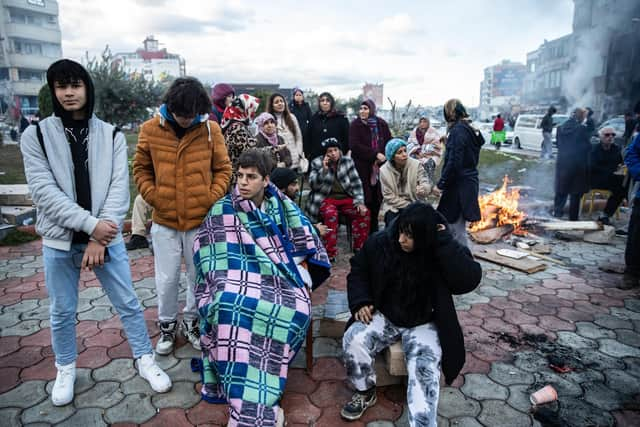Turkey and Syria earthquake: World Health Organisation says death toll could rise to 20,000
At least 5,000 people have died since a 7.8 magnitude Earthquake hit south-eastern Turkey, near the Syrian border in the early hours of Monday morning. In the hours that followed, both countries have felt powerful aftershocks, with thousands thought to be trapped under the rubble of collapsed buildings.
Rescuers have been working overnight to save as many people as possible but bitterly cold weather in the region is reducing the time they have to find survivors. The latest figures suggest more than 13,000 people in Turkey have suffered injuries.
Advertisement
Hide AdAdvertisement
Hide AdTurkey has declared a state of emergency in affected areas and has urged people not to use their mobile phones in order to allow rescuers to coordinate. As well as Turkey and Syria, millions of people in Cyprus, and Israel also felt the earthquake.
European leaders are promising to help the worst hit regions in any way they can, including UK Prime Minister Rishi Sunak. He tweeted: “My thoughts are with the people of Turkey and Syria this morning, particularly with those first responders working so valitanty to save those trapped by the earthquake.
“The UK stands ready to help in whatever way we can.”
Turkey and Syria earthquake: What we know so far.
The first 7.8 magnitude earthquake hit the Pazarcik district of southern Kahramanmaras province at 4.17am. This was followed by a magnitude 6.4 quake in the southern Gaziantep province at 4.26am.
On Monday morning, as rescuers worked to save those trapped in the rubble, south east Turkey felt another significant 7.5 magnitude earthquake. Overnight, more powerful tremors hit Turkey with a 5.4 magnitude quake in the eastern side of the country.
Advertisement
Hide AdAdvertisement
Hide AdOverall, there have been around 285 aftershocks since the first earthquake was felt. It is reported that over 5,000 buildings have collapsed in Turkey alone.


WHO Senior Emergency Officer for Europe, Catherine Smallwood, said: "We always see the same thing with earthquakes, unfortunately, which is that the initial reports of the numbers of people who have died or who have been injured will increase quite significantly in the week that follows.”
The UK has confirmed it will send 76 specialists, equipment and rescue dogs to Turkey. The EU is also set to send search and rescue teams to the country.
Comment Guidelines
National World encourages reader discussion on our stories. User feedback, insights and back-and-forth exchanges add a rich layer of context to reporting. Please review our Community Guidelines before commenting.
